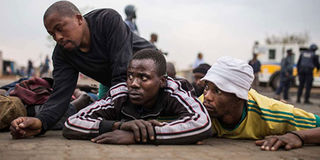‘Xenophobia’ and the elusive Pan-African vision

A group of men lie on the ground after being arrested by members of the Ekurhuleni Metropolitan Police in Johannesburg Katlehong Township, during a new wave of anti-foreigner violence on September 5, 2019. PHOTO | GUILLEM SARTORIO | AFP
What you need to know:
- South Africans attacking Nigerians may not know that the west African country was one of the biggest financiers of the anti-apartheid struggle.
- The Africanist philosophical grounding within which these founding fathers based their love for Africa and Africans was Ubuntu.
If Ghana’s Kwame Nkrumah or Tanzania’s Julius Nyerere were to resurrect, they would not believe what has become of Africa, a continent and a people they invested in unifying.
Nkrumah, Nyerere and their like-minded contemporaries had a sense of urgency in reimagining what Africa needed to be in healing from the colonial misadventure and taking the future into its hands.
Much as they were influenced by Marxist and socialist theories, the Africanist philosophical grounding within which these founding fathers based their love for Africa and Africans was Ubuntu, the Southern African term, loosely translated to “I am because we are”.
Driven by a sense of Ubuntu, of needing Africans to be their brothers’ and sisters’ keepers, Nyerere and Nkrumah spent a chunk of time and resources on Pan-African intellectual and liberation projects to a point where they were accused of forgetting they were leaders of their own countries first.
Nkrumah, who was overthrown in 1966, was accused of being a great Pan-Africanist but not a great Ghanaian.
Under his leadership, Ghana did not attain the levels of growth it had been expected to.
ATTACKS
Nyerere’s Ujamaa experiment did not succeed yet no one can challenge his Pan-Africanist credentials, including hosting and training African National Congress fighters, the Umkhonto we Sizwe.
It is coming from this background, of Africans historically standing by one another, that well-meaning people across the continent continue to condemn the events taking place in South Africa, where elements within the Black population are attacking businesses of Africans from elsewhere on the continent.
These attacks are happening in the pretext of wanting to protect local jobs.
As video recordings and images of Nigerians being attacked in Johannesburg went viral, influential Nigerians took to social media and started firing at South Africans, with musicians like Burna Boy and Tiwa Savage saying they would never set foot in South Africa or perform there unless action is taken to address the attacks black Africans.
Nigeria’s infamous Area Boys, considered goons for hire, descended on South African businesses in Lagos, starting with the supermarket chain Shoprite, where they looted and vandalised property.
ONE PEOPLE
Their anger spilled into Lagos streets, where car windscreens were smashed and motorists harassed.
A number of service centres owned by South African telecommunications company MTN were attacked and ransacked, forcing the multinational to shut its stores across Nigeria.
South Africans attacking Nigerians may not know that the west African country was one of the biggest financiers of the anti-apartheid struggle, with the military Nigerian governments going as far as taxing civil servants in support of the struggle.
Nelson Mandela had kind words for Nigeria, whose support was in the region of that given by Tanzania and the likes of Angola. Yet today, brothers and sisters have turned against one another.
The attacks have been called xenophobia, but then some have argued that Africans cannot be foreigners in South Africa or anywhere on the continent because we are the same people.
Some may call this wishful Pan-Africanist thinking, but before 1884 when colonialists met in Berlin to partition Africa, were we not a people occupying a space without borders?
SAFETY
Some have called these attacks black-on-black violence.
Julius Malema, the leader of the Economic Freedom Fighters party, has argued that black South Africans are fighting the wrong battle, since their enemy is “White monopoly capital”.
Malema’s solution is that black South Africans should not focus on the little gained by Africans working in South Africa, but on dismantling the economic structure by nationalising the country’s strategic resources, like mines and banks.
The debates about what the problems are and what solutions abound will continue.
However, what must happen quickly is that African governments must ensure the safety of Africans and their businesses on the continent.
Failure to do so means what has started in South Africa might result in a domino effect across the continent.




